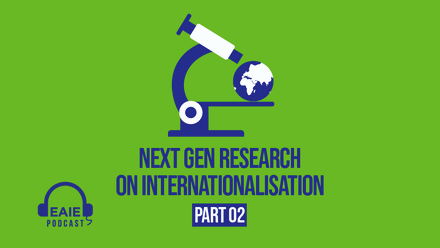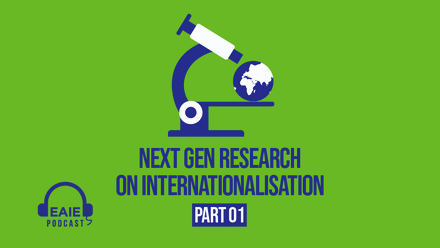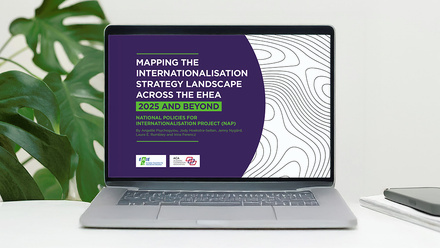Assessing student motivations to study abroad

Students decide to study abroad to achieve a particular purpose, and it is important for higher education institutions to know what motivates them. A new multilingual questionnaire to assess motivations for students is now available to aid in doing just that.
Students are motivated to study abroad by a variety of factors, and there are many reasons why understanding students' motivations is important for higher education institutions. Both sending and host institutions would be well-served by a better grasp of what triggers students’ interest in exchange programmes. Sending institutions, for example, could design communication campaigns to better fit into students' expectations, thus attracting greater attention on the university's exchange programmes offer. Host institutions, as well, have reasons to be aware of the most important drivers for their incoming students and provide them with the best services.
Before we start discussing students’ motivations, however, we first need to distinguish between ‘push’ and ‘pull’ factors. Pull factors are those that influence the selection of the destination once the decision to apply for an exchange programme is taken. Students may choose a particular country because they are interested in improving their skills in the language(s) spoken there, or they may select a specific city because of its cultural offer, or an academic institution for its prestige and reputation. Push factors, instead, are those that influence the demand for international education and motivate students to make plans for their study abroad experience. This post will focus on push factors only.
The push factors leading students abroad
There is little consensus about what the most relevant motivations are, and there is only partial overlap of results across studies in this field. In addition, many studies have been methodologically weak because they, for example, used discipline-specific student samples. Another issue in questionnaires used to assess motivations has been that they were available in English only, thus questioning their validity and large-scale applicability to the international higher education field.
Researchers at the Università Cattolica del Sacro Cuore in Milan (Italy), along with colleagues at Cardiff University (UK) reviewed the relevant literature and interviewed a large number of stakeholders, including students, to develop the Multidimensional Motivations to Study Abroad Scale (MMSAS). The MMSAS is a 27-item questionnaire that assesses the importance of nine motivations to study abroad among higher education students. The questionnaire is available in five languages: English for both native and non-native English speakers, French, German, Italian and Spanish.
The MMSAS was designed to be applicable in real-life settings of international offices, where time efficiency is a must
The nine motivations measured by the MMSAS are listed below, along with an example of each:
- Personal growth: "To encourage myself to change in some way"
- Better academic knowledge: "To get a better university education"
- Learning or improving foreign language skills: "Because the host country language is useful"
- Cross-cultural interest: "To get in contact with people from other countries"
- Career perspectives: "To expand my career opportunities"
- Search for independence: "To find greater freedom"
- Leisure: "To have exciting experiences"
- Getting away from home environment: "To get a break from usual surroundings"
- Others’ expectations: "Because others (relatives and friends) expected me to study abroad"
What the MMSAS can tell international offices and researchers
The MMSAS is scientifically sound, comprehensive, and easy to use. It is scientifically sound because the importance of each motivation has been demonstrated using validity indicators in a multilingual sample of 1333 European long-term (>4 months) study abroad students. For example, the motivation to improve one's academic knowledge was positively related to the number of hours per week spent studying or doing assignments during the study abroad experience, whereas those students who better adjusted to the host country culture reported greater motivations for cross-cultural exchange.
Additionally, because it covers a wide spectrum of reasons, the MMSAS offers a more comprehensive assessment compared to previous measures. Lastly, the MMSAS was designed to be applicable in real-life settings of international offices, where time efficiency is a must. It is easy to use because it takes only a few minutes to be completed, and questions were designed to be simple and straightforward. In addition, the MMSAS is the only instrument that measures motivations to study abroad in the most popular languages in Europe and North America, and its English version has also been proven valid for non-native English speakers. For these reasons, it can fit into to the diverse realities of international higher education.
Data-driven decision making
Having up-to-date information about students’ motivations is invaluable in organising campaigns aimed at increasing participation in learning abroad experiences. The results of this research, for example, show how strong personal growth is as a driver for students, and that improving career perspectives is perceived as less important. This is quite astonishing if we think about how much effort universities worldwide have infused in their campaigns to highlight the connections between study abroad experiences and employability.
In the never-ending job of identifying the right message to most engage students, the MMSAS can reveal extremely insightful and handy information. To learn more, you can refer to the article published on the International Journal of Intercultural Relations.






